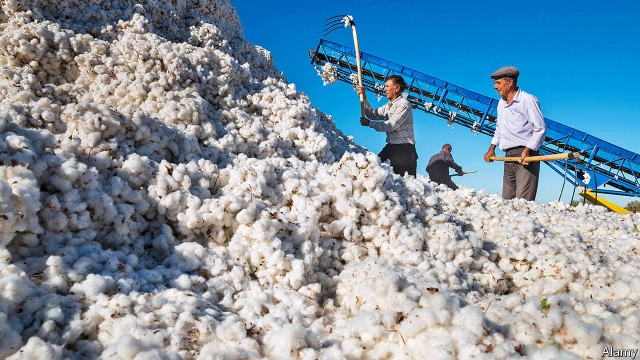Countries
Solidarity campaigns
Uzbekistan tries to end the use of forced labour in the cotton fields

What was unusual was the government’s response to these abuses. Shavkat Mirziyoyev, Mr Karimov’s reforming successor, fired Zoyir Mirzayev, the deputy prime minister responsible for both incidents. Upholding the rule of law and protecting human rights are Mr Mirziyoyev’s priorities, his office huffed, as a criminal investigation was opened.
Under Mr Karimov, netizens would have faced reprisals for discussing such a sensitive topic. But in the current, more forgiving climate they rushed to post photos of themselves in soggy locations striking the same poses the farmers were forced to adopt—at the beach, in the bath and so on. A wag quipped that the sacked official would soon get another job, as coach of the national synchronised-swimming team.
The scandal broke at an awkward time for Mr Mirziyoyev, who wants to shed Uzbekistan’s pariah status. Central to his “Uzbek spring” is a campaign to eliminate forced labour. Under Mr Karimov the government required many adults (and some children) to help harvest cotton. The state enjoys a monopoly over the crop, which is so lucrative that Uzbeks dub it “white gold”. But some big Western retailers are boycotting cotton from Uzbekistan because of the government’s taste for slave labour.
The authorities do seem to have succeeded in stamping out child labour. As a result, America has removed Uzbekistan from a blacklist it keeps on the subject. Last year the government recalled students, teachers, doctors and nurses from the cotton fields. This year it hopes to go further. Wages paid to pickers have risen by a third or more to encourage voluntary workers to replace forced labourers.
The government has invited both the International Labour Organisation and local activists—who used to be arrested for documenting misdeeds in the cotton fields—to monitor the harvest, alongside 300 of its inspectors. It has also set up telephone hotlines and social-media channels for reporting abuses. These have received 1,700 complaints; 120 punishments, from fines to dismissal, have been meted out.
Some observers argue that it will be impossible to root out coercion without abolishing the state’s monopoly on cotton and doing away with production quotas on which officials are judged. All parties agree that forced labour will not disappear overnight. Last year some 336,000 of the 2.6m people involved in the harvest, in a country of 33m, were involuntary workers, the ilo estimates. Mr Mirziyoyev is clearly hoping to reduce that number this year. But if things do not improve, he will presumably resist the urge to punish those responsible by forcing them to stand in a ditch.
This article appeared in the Asia section of the print edition under the headline "Boll and chain"
Source: Economist.com
